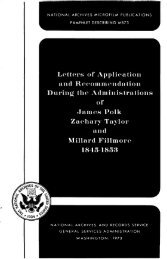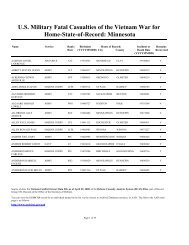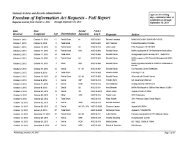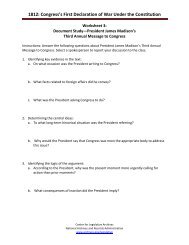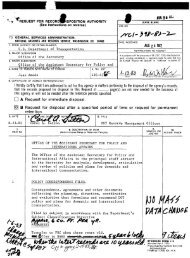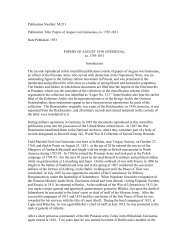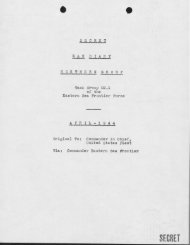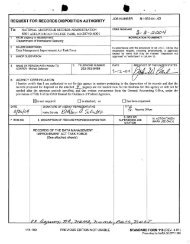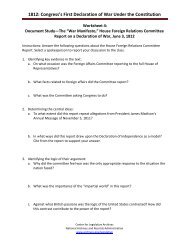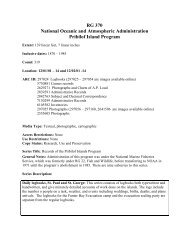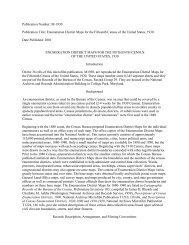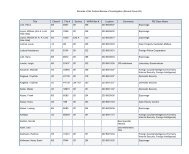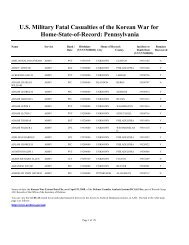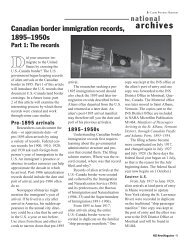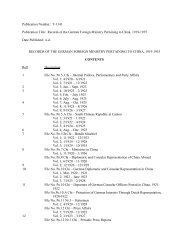HITLER'S SHADOW - National Archives and Records Administration
HITLER'S SHADOW - National Archives and Records Administration
HITLER'S SHADOW - National Archives and Records Administration
Create successful ePaper yourself
Turn your PDF publications into a flip-book with our unique Google optimized e-Paper software.
Foreign Office. Von Mende routinely intervened with the Bavarian government<br />
on B<strong>and</strong>era’s behalf for residency permits <strong>and</strong> the like, <strong>and</strong> now intervened with<br />
the Bavarian authorities for “false passports <strong>and</strong> other documentation.” 73 The<br />
exact results of von Mende’s help are not clear, but B<strong>and</strong>era was left alone.<br />
In April 1959 B<strong>and</strong>era again asked West German intelligence for support <strong>and</strong><br />
this time Gehlen was interested. The CIA noted that, “It [is] apparent that B<strong>and</strong>era<br />
[is] seeking support for illegal ops into Ukraine.” The West Germans agreed to<br />
support at least one such mission based on the “fact [that] B<strong>and</strong>era <strong>and</strong> group<br />
no longer the cut throats they were” <strong>and</strong> because B<strong>and</strong>era “supplied proof [of]<br />
existing contact with inside assets.” A team trained <strong>and</strong> funded by the BND crossed<br />
from Czechoslovakia in late July, <strong>and</strong> the BND promised B<strong>and</strong>era support for<br />
future operations if this one were to be even “moderately successful.” 74<br />
B<strong>and</strong>era’s personal contact in West German intelligence was Heinz Danko<br />
Herre, Gehlen’s old deputy in Fremde Heere Ost who had worked with the<br />
Gen. Andrei Vlassov’s army of Russian émigrés <strong>and</strong> former prisoners in the last<br />
days of the war <strong>and</strong> was now Gehlen’s closest adviser. 75 CIA officials in Munich<br />
repeated the usual warnings. Herre was not dissuaded. “B<strong>and</strong>era,” Herre said,<br />
“has been known to us for about 20 years [!]…. Within <strong>and</strong> without Germany<br />
he has over half a million followers.” Herre, reported the CIA base in Munich is<br />
aware of B<strong>and</strong>era’s earlier reputation [but] is aware that nothing has happened,<br />
during the period of [BND’s] association, indicating that B<strong>and</strong>era still is using<br />
his earlier rough tactics…. [Herre] also feels that, in principle, B<strong>and</strong>era has more<br />
to offer operationally than most if not all other Russian (sic) émigré groups in<br />
the West today. 76<br />
Herre admitted that West German use of B<strong>and</strong>era was a “closely held” secret<br />
even within the BND <strong>and</strong> that the relationship was “not cleared with Bonn due<br />
to political overtones.” 77 By September Herre reported that the BND was getting<br />
“good [foreign intelligence] reports on the Soviet Ukraine” as a result of their<br />
operations. 78 He offered to keep CIA fully informed as to B<strong>and</strong>era’s activities<br />
in return for a favor. B<strong>and</strong>era had been trying to obtain a U.S. visa since 1955<br />
in order to meet with Ukrainian supporters in the United States <strong>and</strong> to meet<br />
with State Department <strong>and</strong> CIA officials. Herre thought that a visa procured<br />
with West German help would improve his own relationship with B<strong>and</strong>era. CIA<br />
officials in Munich actually recommended the visa in October 1959. 79<br />
84 | Collaborators



